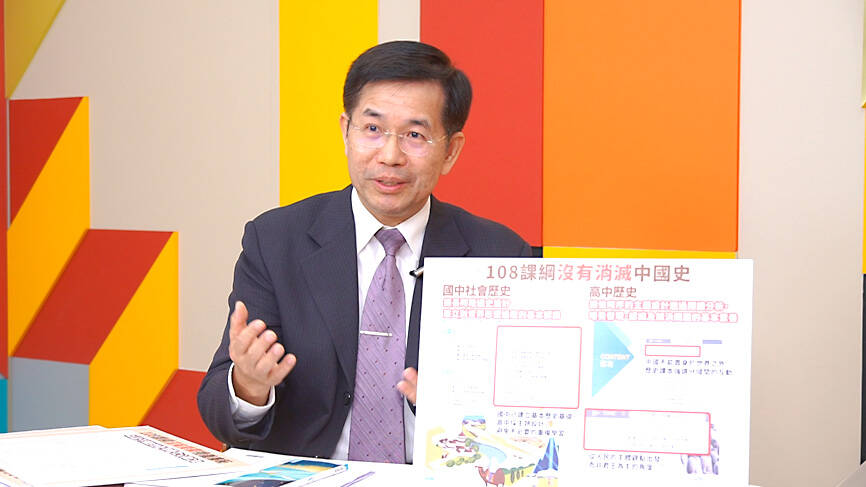The upcoming 2029 curriculum is to keep up with the times, focusing on fostering the qualities of a “global citizen” and enhancing student knowledge of digital technologies and concepts, Minister of Education Pan Wen-chung (潘文忠) said in an interview with the Chinese-language Liberty Times (the sister paper of the Taipei Times) yesterday.
The first Curriculum Guidelines for 12-year Basic Education were implemented in 2019 and were the primary reference material for schools, textbook publishers and the government when preparing courses, textbooks and examinations.
Pan said that the process for reviewing the guidelines was transparent, and members of the review panel had been reviewed and approved by a cross-party committee at the Legislative Yuan, highlighting the guidelines’ transparency and objectivity, compared with previous guidelines.

Photo: Chen Pin-yu, Taipei Times
The guidelines are subject to a review every decade, he said.
Their next iteration would continue to foster qualities required for an individual to be considered a “global citizen,” including the ability to see things from a global perspective, Pan said.
The ministry is aware of the rapid technological changes brought about by the development of generative artificial intelligence (AI), and the National Academy for Educational Research is collecting data in preparation for the 2029 review, he said.
The 2019 guidelines do not explicitly state what kind of information technology (IT) should be taught or used to prevent schools and educators from being constrained, while the overarching theme of developing IT and media competency under the guidelines encourages all studies to use an appropriate level of IT-based education and learning methods, he said.
In the meantime, the ministry would assist teachers in gradually incorporating knowledge of such concepts and skillsets into courses to prepare children for the future, he added.
For example, the ministry in October announced that junior-high schools and elementary schools should use generative AI as a teaching tool, he said.
The ministry would organize workshops starting next year to help teachers use generative AI in course preparation, education and grading, he said.
These efforts would form the foundation upon which the National Academy for Educational Research builds a comprehensive digital learning program that would be led by school principals who are tech-savvy, he added.
The ministry is looking to introduce generative AI into its digital learning platform, and 300 classes nationwide have been asked to participate in a trial to assess the impact of generative AI on student learning, he said.
Pan also rejected allegations that the 2019 guidelines were “immoral and shameless,” citing Taiwan’s ranking on the 2023 World Competitiveness Yearbook as proof of their success.
Taipei First Girls’ High School Chinese literature teacher Ou Kui-chih (區桂芝) on Monday criticized the guidelines for reducing the number of classical Chinese texts taught in schools, citing specifically the omission of writings about morality by the Ming Dynasty academic Gu Yanwu (顧炎武), the omission of which Ou said failed to teach students about propriety.
Pan said that the 2019 guidelines exposed children to new and more critical issues and increased their competitiveness.
He also said that literary Chinese education aims to foster students’ mental acuity for analysis and learning to express their opinions, and the “point” was not whose works were being cited or how much literary Chinese was studied.

Taiwanese can file complaints with the Tourism Administration to report travel agencies if their activities caused termination of a person’s citizenship, Mainland Affairs Council Minister Chiu Chui-cheng (邱垂正) said yesterday, after a podcaster highlighted a case in which a person’s citizenship was canceled for receiving a single-use Chinese passport to enter Russia. The council is aware of incidents in which people who signed up through Chinese travel agencies for tours of Russia were told they could obtain Russian visas and fast-track border clearance, Chiu told reporters on the sidelines of an event in Taipei. However, the travel agencies actually applied

Japanese footwear brand Onitsuka Tiger today issued a public apology and said it has suspended an employee amid allegations that the staff member discriminated against a Vietnamese customer at its Taipei 101 store. Posting on the social media platform Threads yesterday, a user said that an employee at the store said that “those shoes are very expensive” when her friend, who is a migrant worker from Vietnam, asked for assistance. The employee then ignored her until she asked again, to which she replied: "We don't have a size 37." The post had amassed nearly 26,000 likes and 916 comments as of this

New measures aimed at making Taiwan more attractive to foreign professionals came into effect this month, the National Development Council said yesterday. Among the changes, international students at Taiwanese universities would be able to work in Taiwan without a work permit in the two years after they graduate, explainer materials provided by the council said. In addition, foreign nationals who graduated from one of the world’s top 200 universities within the past five years can also apply for a two-year open work permit. Previously, those graduates would have needed to apply for a work permit using point-based criteria or have a Taiwanese company

The Shilin District Prosecutors’ Office yesterday indicted two Taiwanese and issued a wanted notice for Pete Liu (劉作虎), founder of Shenzhen-based smartphone manufacturer OnePlus Technology Co (萬普拉斯科技), for allegedly contravening the Act Governing Relations Between the People of the Taiwan Area and the Mainland Area (臺灣地區與大陸地區人民關係條例) by poaching 70 engineers in Taiwan. Liu allegedly traveled to Taiwan at the end of 2014 and met with a Taiwanese man surnamed Lin (林) to discuss establishing a mobile software research and development (R&D) team in Taiwan, prosecutors said. Without approval from the government, Lin, following Liu’s instructions, recruited more than 70 software